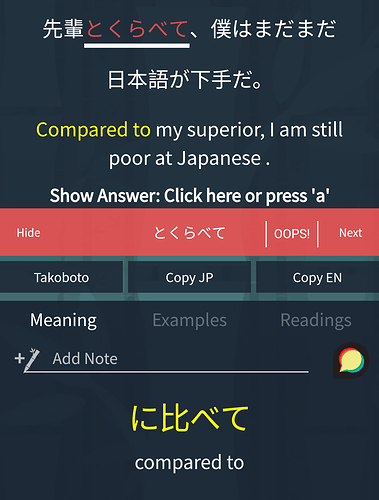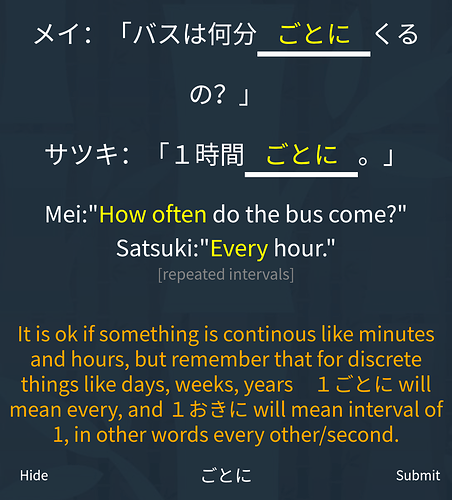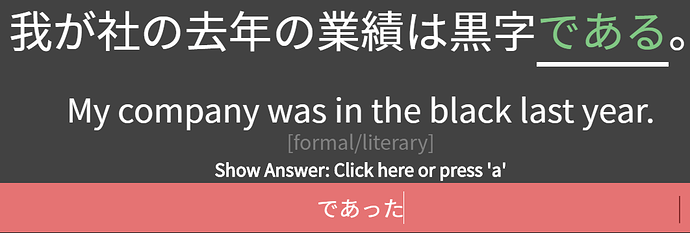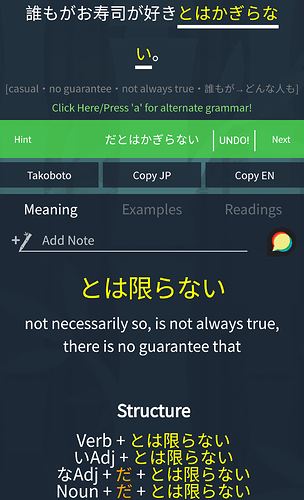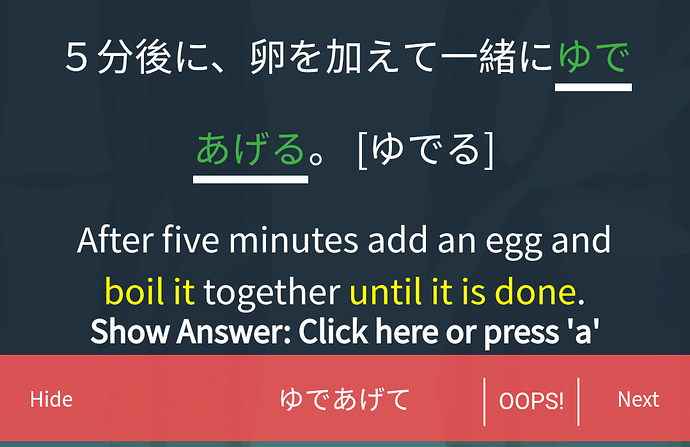This is possible as well:
@airblaster Thank you for your response. We are looking into the issue and hope to have a fix for you soon. Thank you for your patience. Cheers!
@Anthropos888 Thank you for drawing this to our attention. We have added this to alternative answers and included a note on the subtle differences in nuance between に比べて and と比べて. Cheers!
Just wanted to tell you that everything worked fine in my review session just now.
-
this hint is confusing since the question is looking for “every” in connection with “minutes” (and not “discrete” things as described in the hint). So actually this hint is not needed here.
-
you give away the correct answer in the hint by mentioning おきに, that’s too easy. Better: “not looking for ごとに”
@airblaster That is great to hear! Please let us know if you experience the issue again. Thank you for your patience. Cheers!
@Kai Nice find! We have added that to the list of alternate answers. Cheers!
@Anthropos888 Thank you for drawing this to our attention. Fixed! Cheers!
I reported this with the report button, but I’ll repeat here just in case they can’t see enough from such a report.
I answered wrong. It marked me red, but didn’t give me the correct answer. There was no option to show it.
I don’t believe で is actually correct here.
In all the time I’ve studied Japanese, I’ve never seen 住む follow anything other than に.
I tried searching Google for “で住む,” and although it gets ~2 million hits (compared to “に住む” getting 36 million), the top result is someone asking for the difference between で住む・に住む, and the top-rated answer explicitly says:
「どこで住んでいますか?」とは言いません。
(“どこで住む~ isn’t said.”)
The 2nd-highest response also says:
「アメリカで住んでいます」 も意味は通じますが、少し変な日本語の感じがしますので 「に」 の方をお奨めします。
(“~ gets the meaning across, but the Japanese is a bit strange so I recommend using に”)
Edit:
Also, shouldn’t this answer be past tense?
Either way, the English hint feels very misleading.
After hitting submit, Bunpro shows the answer without だ but according to the structure it is needed. So what is correct here?
Where should I put feedback for BP forum? I guess I’ll just put it here, eh? I noticed some avatars not showing up 
@MissDagger Thank you for pointing this out to us. Looks like the hint that Bunpro provides when you get an answer correct for a specific reason interferes with the ability to view the correct answer. We will look into it and hopefully have a fix pushed soon. Cheers!
@Kai Nice finds! We have corrected のなかで to のなかに for this example and will probably be replacing this sentence with one that uses のなかで. である should most definitely be であった. All fixed. Thank you for pointing these out to us. Cheers!
@Anthropos888 We have removed the alternative answer that does not include だ。だ is needed after a な-adjective and before とは限らない. Thank you for drawing this to our attention. Cheers!
@nanda It might have to do with the browser (looks like you are using Safari and we will attempt to recreate this on our end). We will look into what might be causing the display hiccups. Cheers!
Real small one - I am going through the Genki II track, and I’m at Chapter 14. “Ageru/morau/kureru” aren’t added to Bunpro yet, but “te-kureru” is. The “te-kureru” grammar point Readings tab says Genki II, 1st edition on page 34 (and 74). “Te-keruru” isn’t demonstrated at all in Genki II 1st edition in Chapter 14 or page 34 (although just plain “ageru/morau/kureru” are.) It looks like breaking “kureru” and “te-kureru” apart might be a newer thing, and this might just be a holdover from when there was only one entry. Small beans, but just saying.
The translation is imperative but you’re looking for the dictionary form. So please accept the て form as well or rewrite the translation.
You gotta get a Japanese font properly installed. Your picture shows the Chinese version of 緒.
I know. Bunpro needs to change the lang attribute to lang=“ja” otherwise Android phones will show the Chinese version of the character. That’s a know issue on Android since years and I asked Bunpro a couple of times to change it but no response so far…
Ah, that’s a pain…
Does this sentence seem strange to anyone else?
In this [A、B] sentence, both A and B make sense, but as far as I can tell, A and B don’t fit together.
Speaking from personal experience, I am terrible at housework, and even though I would very much not like to do it, I can’t not do it. (Though I go rather long, enough to make my mother scream I’m sure, stretches of not doing it.)
What makes you think they can’t be connected?
Nevermind, my understanding of (だ)からといって was just too limited.
I thought it was only used to refute or contest a presumption, sort of like わけではない.
Looks like it’s more along the lines of, “While ◯ may be true…”

